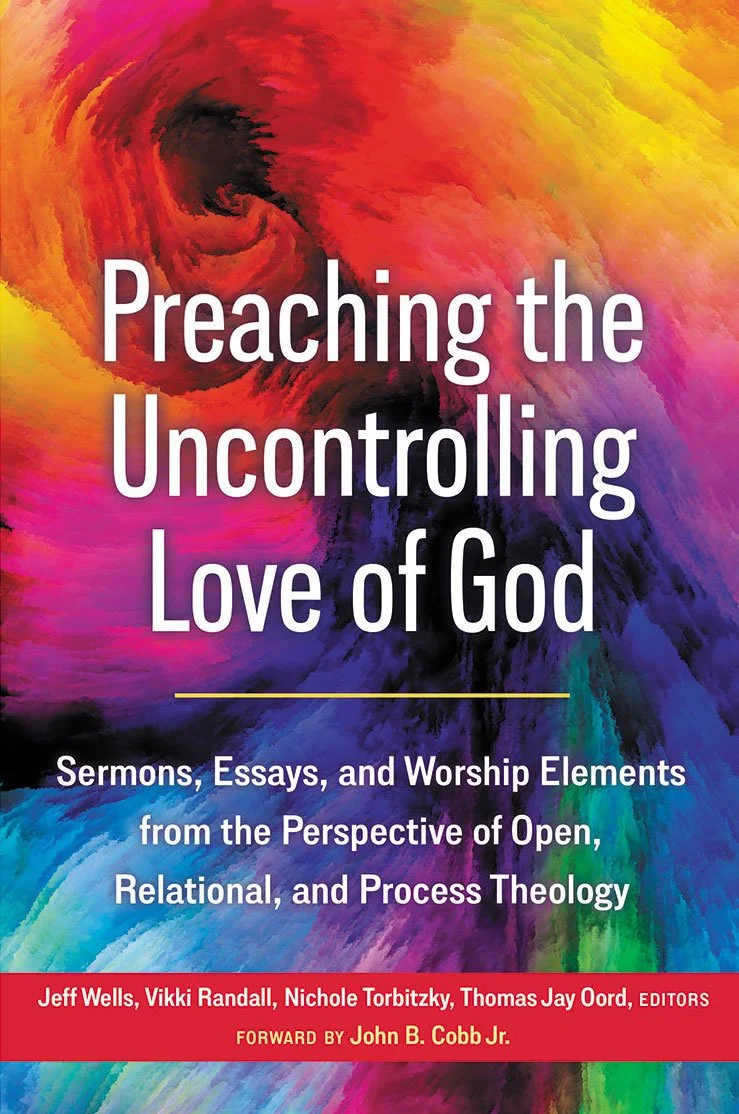Grace: the uncontrolling love of god
Fourth Sunday after Epiphany● January 28, 2024
Readings: Lamentations 3:22-23 & Romans 8:35-39 (The Inclusive Bible)
Rev. Jeff Wells © 2024
You can view the full worship video recording at:
iStock Image #911764800, by agsandrew
Friends, God is good, all the time. And all the time, God is good. God is faithful. God’s love and God’s grace never fail. God’s very nature is love and God’s grace is God’s uncontrolling love in action. When we utter those words, “God’s grace,” we are talking about God’s mercy, compassion, comfort, care, and forgiveness, as well as all the ways God leads, inspires, beckons, and calls us forward in every moment toward goodness, beauty, love, and justice.
We are immersed in it – we swim in God’s grace like fish in the ocean or cells in the bloodstream. It is ever-present. And God’s grace is never coercive, but always deeply relational and interactively seeking and engaging with our responses to whatever possibilities God offers us in a given context.
This means there is a constant interplay between God’s grace and our freedom. Our freedom is limited by our history, especially by the most recent history of the world we live in and by our specific history and circumstances. Because of past choices we have made and actions we have taken as well as the impact on us of choices and actions of others, the possibilities available to us are limited. Moreover, such possibilities are not equally available. People with less privilege and power tend to have fewer options to choose from. Yet, we all have some freedom to choose from among the best possibilities God offers us for thinking, acting, and relating. Sometimes we choose well – we make the choice God desires. Other times, we miss the mark – we choose poorly, thoughtlessly, or in unloving ways. Yet, no matter who we are, no matter what mistakes or bad choices we have made in the past, God never gives up on us. God’s grace is new every morning.
And God offers love and grace to everyone. As Jesus said, “God makes it rain on the just and the unjust.” Yet, I am convinced that for us to be able to experience God’s love and leading and to respond well, it really helps to have it in our minds that God is with us and is calling us forward every moment. And participating in a community of faith like ours helps to sharpen our spiritual hearing and feeling of what God is continually offering.
Of course, even being very attuned to God’s beckoning does not mean we get to avoid the suffering and evil that affect all of our own lives. We know this from personal experience. God is faithful and ever-present, but God cannot single-handedly prevent suffering and evil. God works through us and other elements of creation to lessen their impacts. So often the social, political, economic, and personal circumstances God has to work with do not make that easy. And yet, there is a popular expression that arose out of the Black American experience and especially the Black church that says, “God makes a way out of no way.” I encourage us to reimagine that powerful adage in light of our understanding of God as all-loving and very persuasive, but not all powerful. Then, it is more profound and accurate to say, God beckons us to build up strength and resilience in the face of oppression, hatred, exclusion, exploitation and other evils and calls us to recognize and co-create with God the way out of no way that exists in a given context (see Monica A. Coleman, Making a Way Out of No Way: a womanist theology, 2008).
God’s grace also functions in situations that are less risky and dangerous, but where God calls us to stretch and grow. We may be intimidated by what we perceive God calling us to do or we may worry we don’t have what it takes. God is patient with us, but is very persistent, too. I want to share a recent personal example of such a call from God that was both complicated and challenging and forced me to take risks and to grow. It developed over time and I could sense God working in and through me and others all along the way – that includes all of you in our community of the Church of the Village.
As many of you know, I spent 20 years away from church as a left-wing political activist. When God lured me back to a United Methodist church here in Manhattan, in the late 1990s, I immediately gravitated to those who labeled themselves “progressive Christians.” But I confess my progressive Christian faith and practice had a very weak foundation. It lacked a theological framework to hold it all together and answer a lot of very hard questions about God.
Now, fast forward – I felt called to ministry, went to seminary and, in 2005, I was commissioned as a provisional elder and later ordained. Then, in 2015, Bishop Jane Middleton appointed me to the Church of the Village. That was a very happy surprise and I absolutely believe God’s influence played a large role in that decision.
As I said, God offers us possibilities, but the options God offers are never forced on us. We have to pay attention, respond, and choose to move or act in particular ways. I am sure that God’s inspiration was in the mix when someone introduced me to a book titled, Process Theology: A Basic Introduction (C. Robert Mesle, 1993). When I began to grasp the breadth and deep significance of process-relational and open and relational theology, I had a Damascus Road experience. My eyes were opened to new ways of seeing God and the world. Also, I realized that I had been preaching process-aligned theological ideas for years. In that way too, I believe God was leading and preparing me.
I don’t claim credit for introducing process or open and relational theology to our congregation. By 2016, our whole Worship Vision Team already thought of process theology as an important, though not dominant, part of our discernment. By 2020, when Pastor Alexis join us, she and Jorge Lockward and Katie Reimer had all studied process theology. When Alfida Figuerao took over as Worship chair she was already open to this theological leaning. God has been intimately involved in a long-term process of interacting with each of us, not determining our decisions, but recognizing the possibilities in each of our paths and how we might work together for good in and beyond the Church of the Village.
In August and September of 2021, the Worship Vision Team created our first worship series focused explicitly on teaching process theology to this congregation. It was very well received. Immediately after that, we planned a five-week series on being disciples of Jesus (“In the Way of Jesus: An Adventure of Imagination and Commitment”). Jorge came up with the audacious idea of inviting theologian, John Cobb, to preach on three consecutive Sundays – and John actually agreed!
After those two worship series, I came up with the idea – no, it’s more accurate to say, “God suggested to me the idea” of creating a little book from those sermons and perhaps a few others from the small number of process-influenced clergy or congregations I knew were similarly engaging process theology.
Now, remember, we were still in the midst of the Covid-19 pandemic. It was a very busy and challenging time to be a pastor. Looking back, I think it was all of that and that I felt intimidated and hesitant about embarking on such a project. After all, I was relatively new to process theology and had no previous experience editing or publishing a book. So, the book project simmered on a back burner for more than a year.
Then, I received in my inbox, an invitation to attend the 50th Anniversary Conference of the Center for Process Studies. I signed up and flew to southern California in February 2023. Yes, less than a year ago. And there, God intervened again, inspiring me to introduce myself to Mary Elizabeth Moore, the retired dean of the Boston University School of Theology and a long-time process theology proponent. I described my vision for the book to her and she immediately replied, “Don’t wait. Do it now. We need that book!”
So, last spring, I requested and received approval from the Church of the Village to take an 8-week paid leave of absence over the summer to get the book underway. Surely, God’s lure played a role in that approval, too. Thanks to God’s leading and my listening, early on, I met on Zoom with Thomas Jay Oord, the founder of open and relational theology, to get his recommendations for possible contributors to the book. I knew Tom because he had been a guest preacher with the Church of the Village, too. I learned later he was an important mentor and friend of Pastor Alexis. After I shared my vision for the book with Tom, he said, “I would like to co-edit this book with you.” Of course, I jumped at his offer. He then recruited two other excellent co-editors for our team. I hope you see how God’s beckoning and our human agency continually interacted to promote positive outcomes and to bring together the gifts of many people. God led us and continues to lead us in the Church of the Village to create the kind of community out of which the inspiration for this book could arise. John Cobb gives direct credit to you in his Foreword, “We rejoice that communities of process Christians have emerged who are pursuing the work of integration independently and sharing what they have learned. The vision for this book arose out of the work of one of those communities…the Church of the Village.”
I believe God inspired the idea in me and then inspired others to push me and collaborate with me to work on this book. And, God helped co-create the conditions to be able to bring it to fruition. I am very happy to tell you the manuscript was sent off to the publisher this week and will be in print by the end of March. We already have a beautiful cover design and are beginning to publicize it on social media.
Preaching the Uncontrolling Love of God is the first book to provide a broad compilation of sermons, essays, and worship elements meant to show in practice and in specific contexts, how to present open, relational, and process theological perspectives to and for leaders and members of local churches. So, friends, I encourage you to be very proud and rejoice that you participate in continually co-creating and co-sustaining with God this community that played such a large role in making this book possible.
We face challenges as a congregation, yet God is at work among us trying to co-create a way out of no way with us. Amid the challenges, we get to experience God’s presence and practice loving one another in a beautiful, inclusive, and compassionate community. We have the privilege, too, of sharing with the world a powerful example and profound message of the uncontrolling love and grace of God. May God’s ever-present grace help us to keep bearing much good fruit.
Copyright (c) 2024 - Rev. Jeff Wells
All rights reserved.


